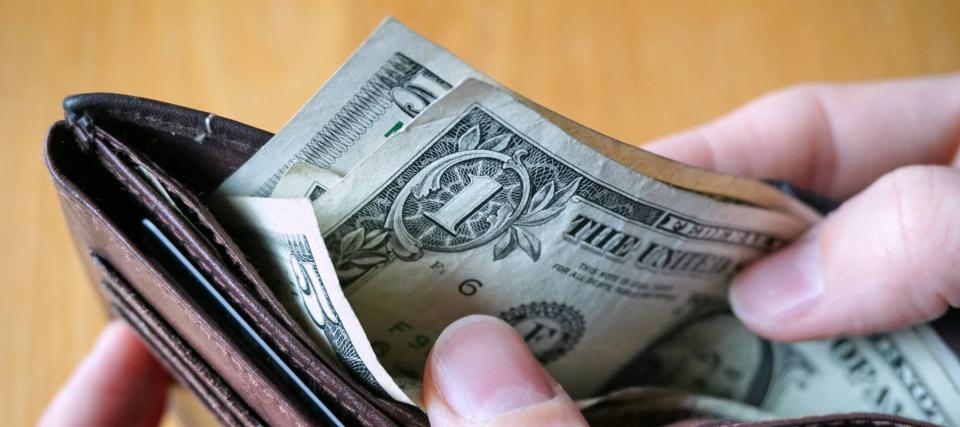‘If you don’t need it, don’t buy it right now’: Here’s where the Fed’s new rate hike will hit you hardest and what you can do about it

After lowering interest rates to spur on spending during the pandemic, the Federal Reserve would very much like you to stop now — at least until inflation is under control.
The Fed raised the federal funds rate 75 basis points for the second consecutive month, making this the fourth rate hike since March.
The benchmark interest rate now sits in the range of 2.25% to 2.5%, which doesn’t sound too bad. But banks and lenders then add their interest rates on top of that, which is when your credit starts to get pricey.
“When the price of peanut butter goes up, it’s bad for the sales of jelly – so If the price of credit goes up, it’s bad for things where people typically rely on credit to get it,” says Mark Witte, professor of instruction in economics at Northwestern University. “Housing, cars, things of that nature.”
But there are ways to keep your costs lower even when they seem out of your control.
Don’t miss
-
If your retirement plans have been thrown off by inflation, here’s a stress-free way to help you get back on track
-
A TikToker paid off $17,000 in credit card debt by ‘cash stuffing’ — can it work for you?
-
Too many Americans are still missing out on cheaper car insurance
Mortgages
Before the rate rise Wednesday, the average 30-year fixed rate mortgage sat at 5.5%, almost double what it was this time last year.
If you already own a home and have a fixed rate mortgage then the raise won’t immediately impact you. But if you have a variable rate, you may see a difference. And if you’re looking to buy now, you’ve already lost a significant amount of buying power.
“For every percent that the rate goes up, there’s about a half a million less people qualifying for a home,” says John Mallett, president of Main Street Mortgage, a mortgage broker in Ventura County, California.
But not all hope is lost.
“It is starting to become an equalized market where supply is getting towards meeting demand,” says Mallet.
That gives a prospective buyer more options.
“It’s possible that people can, when they make the offer on a home, they can ask the seller to pay for $10,000 of closing costs that will go towards buying down the rate. So you can do rate buydowns. And it’ll make it easier for them to actually qualify for financing.”
Mallett suggests considering a temporary rate buydown, which allows the buyer to pay a lower interest rate for the first couple of years before it rises to the regular rate.
Both a buyer and a seller can pay for the buydown and it can be a lump sum payment using mortgage points. One mortgage point equals 1% of your total loan amount. So for example, on a $100,000 loan, one point would be $1,000. Sellers will sometimes use it to incentivize a sale.
If you already own a home and have a home equity line of credit, those rates will be affected by the Fed’s increase.
Credit cards
Americans have a lot of credit card debt – over $840 billion worth. And when the federal funds rate goes up, so does the interest on that debt.
The median interest rate on credit cards in July before the Fed’s rate rise was [20.8%](https://www.lendingtree.com/credit-cards/average-credit-card-interest-rate-in-america/.
It’s becoming more and more important to pay down your credit card balance, says Jim Droske, president of Illinois Credit Services, a credit counseling service outside Chicago.
“That’s not always realistic for people,” he says. “But if they can, they should pay them down so there is no balance to have an interest rate charged on.”
Another option is calling your credit card company and asking for a rate reduction, says Droske. “Sometimes those companies just won’t bring it up. But if you ask, sometimes they’ll give you a better program.”
Car loans
Your car loans won’t escape the rate hike either. In the first quarter of 2022, the national average rate for a 60-month car loan was 4.07%, according to Experian), and it will be going up slightly with the Fed’s announcement.
For the best rate on a car loan, you need to shop around and check with multiple financiers, but Droske says a decent credit score is the key.
“Your credit is extremely important when you go for a car loan,” he says. “Just because you get approved for a loan doesn’t mean [it has] good terms, and they can be all over the board – I mean, you could pay 19%, you could pay 9%.”
What you do end up paying is largely based on your credit score, he says. So while the benchmark interest rate will affect what you pay, how you have dealt with your credit will have a huge impact on your rate.
Better credit is going to go a long way here
The good news is that there’s a lot you can do to clean up your credit score.
“In a …financial world based on interest rates, credit is king,” Droske says.
He says you should check your credit score for any discrepancies or errors or medical debt that has yet to be removed. You should also pay down your credit balances as much as you can and see if you can get a higher credit limit.
But the best advice right now, might be the simplest.
“If you don’t need it, don’t buy it right now,” says Droske. “People tend to go out and buy cars sometimes when they don’t need to and all those things are very expensive right now.”
What to read next
This article provides information only and should not be construed as advice. It is provided without warranty of any kind.




